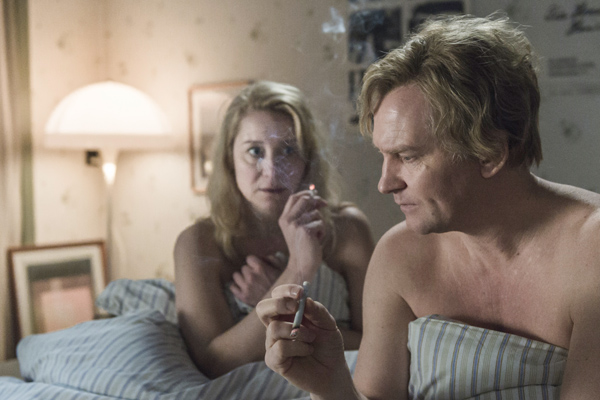It’s difficult to avoid talking about awards when attending a fall film festival. Days before the Venice Film Festival opened, its director, Alberto Barbera, was predicting in the Hollywood Report that Amy Adams could start her Oscar campaign for Nocturnal Animals there on the Lido. Additionally, Isabelle Huppert will make appearances in both the Toronto and New York film festivals to promote the brutal and brittle Elle, an indication that its distributor, Sony Pictures Classics, is promoting her to finally earn an Academy Award nomination.
Of course, it’s assumed that perennial nominee Meryl Streep will be invited back for Florence Foster Jenkins, but she’s the only likely candidate in the Best Actress category so far (though it’s early September). However, there’s one name that should appear on the lists of this year’s contenders (and formidable performances) if it were to qualify: Trine Dyrholm of the compelling The Commune, which made its North American premiere at the Toronto International Film Festival. (At the announcement of the festival’s lineup, the film still had no American distributor.)
Dyrholm, one of Denmark’s leading actors, has the seal of approval from Streep herself, having won the award for Best Actress at this year’s Berlin Film Festival, given by a jury headed by the actress. As for The Commune’s writer/director Vinterberg, he is perhaps best known in the U.S. for his recent version of Far from the Madding Crowd; he first came to prominence with 1998’s The Celebration, where a family reunion sours into recriminations. It featured Dyrholm and her Commune costar Ulrich Thomsen.
Based in part on Vinterberg’s experiences growing up in a Copenhagen commune during the 1970s and ’80s (and his stage play), it begins with a 50-ish architectural professor, Erik (Thomsen), touring his large, multi-storied childhood home with his wife, Anna (Dyrholm), and their quiet teenage daughter, Freja (an impressive Martha Sofie Wallstrom Hansen). He has just inherited the domicile upon his father’s death, but neither he nor his wife has a salary that can pay for the taxes and upkeep for a structure this big. (Their financial status is a head-scratcher, given that Anna is a well-known celebrity/TV news anchor.)
So Anna casually drops a suggestion: Why don’t they ask their friend Ole (Lars Ranthe) to move in with them? (In fact, she has already called him.) Erik cautiously accepts; Ole doesn’t have money, or maybe his enthusiasm doesn’t match Anna’s after her admission that she has always wanted to live with Ole.
Anna mentions another friend as an additional roommate, a woman with a husband and a boy with a heart condition. Five others in total, all of middle age, move in, though no one seems to have a means of support, yet Erik and Anna declare they will give the house to everyone as owners. There will be no leader, no rules (uh, oh), and nude group swims and evening meals for everyone.
The vibe of the house isn’t an overtly political, hippy-dippy utopia of communal cooperation. Viewers receive kitsch-free clues that the story takes place in the 1970s mainly through news references to Pol Pot and the type of cars on the street. It’s a subdued portrayal of that decade: earth tones are in; bell-bottoms are out. As it happens, Anna and Erik were well into their thirties by the time of the counterculture told hold in the late ’60s.
Indeed, the real fireworks take place not among the roommates but between Anna and the heretofore tightly buttoned-up Erik, and in this way the title is a little misleading. It is about power dynamics, not among the makeshift metaphorical family but rather between Erik, Anna, and their daughter as the roomies fade into the background. The trio’s equilibrium wobbles when Erik begins an affair with a 24-year-old student, Emma (Helene Reingaard Neumann), who looks like she could be Anna’s much younger sister. However, the commune plays its part in the marital implosion when Erik requests the group’s approval of Emma as its newest member.
One reason Dyrholm’s role stands out is because it’s so well-written, and it gives her plenty to react to (more so than, say, Streep’s turn in Florence). Unlike the other characters, Anna lets it rip, while the rest of the household tries its best to stay cool. Rejected and sipping too many glasses of white wine (openly at work, no less), she oozes such intensity in her painful-to-watch (but not histrionically excessive) meltdown that the harshly-lit, hand-held close-ups are unnecessary. Viewers would feel her performance even if it was staged and they were seated far in the back row.
Vinterberg directs the entire ensemble subtly, enough so that the undercurrents emerge in flashes here and there. The well-modulated flare-ups are spaced out with enough time for resentment to build up. Instead of a hot-house drama, Vinterberg and his co-writer Tobias Lindholm (writer/director of the bluntly named A War and The Hijacking) let go of the restraints at the right moments.
Overall, this latest film is more tempered and less nerve-wracking than The Celebration or Vinterberg’s 2012 nail-biter The Hunt. Though there are a few gaps in motivation (Where did Anna get the idea of the commune, instead of say, just renting out rooms?), the performances and the fireworks don’t disappoint.
The Commune screens on September 16, 17, and 18.







Leave A Comment